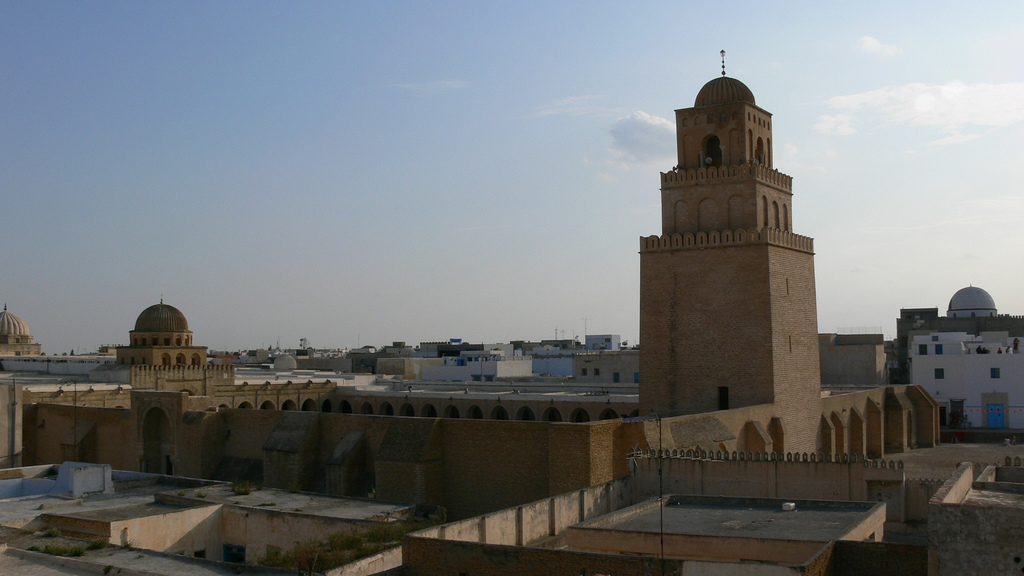
Ninety-nine percent of Tunisians are Muslim. Most of them are Sunni belonging to the Malikite madhhab, but a small number of Ibadhi Muslims (Kharijites) still exist among the Berber-speakers of Jerba Island.
The government controls and subsidizes mosques and pays the salaries of prayer leaders. The President appoints the Grand Mufti of the Republic. The 1988 Law on Mosques provides that only personnel appointed by the Government may lead activities in mosques and stipulates that mosques must remain closed except during prayer times and other authorized religious ceremonies, such as marriages or funerals. Some people may be interrogated just for associating or being seen in the street with practising Muslims. New mosques may be built in accordance with national urban planning regulations; however, upon completion, they become the property of the Government. The Government also partially subsidizes the Jewish community.
There is a small indigenous Sufi Muslim community; however, there are no statistics regarding its size. It is reporeted that many Sufis left the country shortly after independence when their religious buildings and land reverted to the government (as did those of Orthodox Islamic foundations). Although the Sufi community is small, its tradition of mysticism permeates the practice of Islam throughout the country. There is a small indigenous “Maraboutic” Muslim community that belongs to spiritual brotherhoods known as “turuq.” The Muslim holidays of Eid al-Adha, Eid al-Fitr, and Mawlid are considered national holidays in Tunisia.
Christianity
The Christian community, composed of indigenous residents, Tunisians of Italian and French descent, and a large group of native-born citizens of Berber Arab descent, numbers 25,000 and is dispersed throughout the country. There are an estimated 20,000 Catholics. The Roman Catholic Church in Tunisia, which forms the Archdiocese of Tunis, operates 12 churches, 9 schools, several libraries, and 2 clinics. In addition to holding religious services, the Catholic Church opened a monastery, freely organized cultural activities, and performed charitable work throughout the country. According to church leaders, there are 2,000 Protestant practicing Christians, including a few hundred citizens who have converted to Christianity. The Russian Orthodox Church has approximately 100 practising members and operates a church in Tunis and another in Bizerte. The Reformed Church of France maintains a church in Tunis, with a congregation of 140 primarily foreign members. The Anglican Church has a church in Tunis with several hundred predominantly foreign members. There are 50 Seventh-day Adventists. The 30-member Greek Orthodox Church maintained 3 churches (in Tunis, Sousse, and Djerba). There are also 50 Jehovah’s Witnesses, of whom half are foreign residents and half are native-born citizens. Occasionally, Catholic and Protestant religious groups held services in private residences or other locations.
Other religions
Judaism is the country’s third largest religion with 1,500 members. One-third of the Jewish population lives in and around the capital, and is descended predominantly from Arab and Spanish immigrants. The remainder lives on the island of Djerba, where the Jewish community dates back 2,500 years.
The Bahá’í Faith in Tunisia begins circa 1910 when the first Bahá’í arrives, possibly from Egypt. In 1963 a survey of the community counted 1 assembly and 18 organized groups (between 1 and 9 adults) of Bahá’ís in Tunisia. US State Department 2001 estimates mention the Bahá’í community at about 150 persons. However Association of Religion Data Archives and several other sources point to over 1000 Bahá’ís in the country.
Freedom of religion
The Constitution of Tunisia provides for freedom of religion and the freedom to practice the rites of one’s religion unless they disturb the public order; however, the government imposes some restrictions on this right. The Constitution declares the country’s determination to adhere to the teachings of Islam and stipulates that Islam is the official state religion and that the president must be Muslim. The government does not permit the establishment of political parties on the basis of religion and prohibits efforts to proselytize Muslims. It restricts the wearing of Islamic headscarves (hijab) in government offices, and discourages women from wearing the hijab on public streets and at certain public gatherings. Although changing religions is legal, there is great societal pressure against conversion of Muslims to other religions.
The government allows a small number of foreign religious charitable nongovernmental organizations (NGOs) to operate and provide social services.